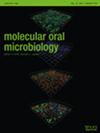甲硝唑在牙周炎治疗中可能具有抗炎功能:范围综述
IF 2.9
3区 医学
Q1 DENTISTRY, ORAL SURGERY & MEDICINE
引用次数: 0
摘要
目的甲硝唑(Metronidazole,MTZ)是一种用于治疗厌氧菌感染的抗菌剂。据推测,MTZ可能还具有抗炎特性,但相关证据有限,且此前未对其进行过综述。因此,本次范围界定综述旨在回答以下问题:"方法根据 PRISMA-ScR 声明进行了范围界定综述。结果共发现 719 条记录,纳入 27 项研究(21 项体内研究和 6 项体外研究)。这些研究报告了 MTZ 在以下方面抗炎作用的实验证据:(1) 先天免疫(屏障通透性、白细胞粘附性、免疫细胞群);(2) 后天免疫(淋巴细胞增殖、T 细胞功能、细胞因子谱);(3) 伤口愈合/炎症消退。我们建议今后应开展临床研究,评估 MTZ 在牙周炎治疗中的具体抗炎途径。本文章由计算机程序翻译,如有差异,请以英文原文为准。
Metronidazole may display anti‐inflammatory features in periodontitis treatment: A scoping review
AimMetronidazole (MTZ) is an antimicrobial agent used to treat anaerobic infections. It has been hypothesized that MTZ may also have anti‐inflammatory properties, but the evidence is limited and has not been previously reviewed. Thus, this scoping review aimed to answer the following question: “What is the evidence supporting anti‐inflammatory properties of metronidazole that are not mediated by its antimicrobial effects?”MethodsA scoping review was conducted according to the PRISMA‐ScR statement. Five databases were searched up to January 2023 for studies evaluating the anti‐inflammatory properties of MTZ used as monotherapy for treating infectious and inflammatory diseases.ResultsA total of 719 records were identified, and 27 studies (21 in vivo and 6 in vitro) were included. The studies reported experimental evidence of MTZ anti‐inflammatory effects on (1) innate immunity (barrier permeability, leukocyte adhesion, immune cell populations), (2) acquired immunity (lymphocyte proliferation, T‐cell function, cytokine profile), and (3) wound healing/resolution of inflammation.ConclusionTaken together, this scoping review supported a potential anti‐inflammatory effect of MTZ in periodontitis treatment. We recommend that future clinical studies should be conducted to evaluate specific MTZ anti‐inflammatory pathways in the treatment of periodontitis.
求助全文
通过发布文献求助,成功后即可免费获取论文全文。
去求助
来源期刊

Molecular Oral Microbiology
DENTISTRY, ORAL SURGERY & MEDICINE-MICROBIOLOGY
CiteScore
6.50
自引率
5.40%
发文量
46
审稿时长
>12 weeks
期刊介绍:
Molecular Oral Microbiology publishes high quality research papers and reviews on fundamental or applied molecular studies of microorganisms of the oral cavity and respiratory tract, host-microbe interactions, cellular microbiology, molecular ecology, and immunological studies of oral and respiratory tract infections.
Papers describing work in virology, or in immunology unrelated to microbial colonization or infection, will not be acceptable. Studies of the prevalence of organisms or of antimicrobials agents also are not within the scope of the journal.
The journal does not publish Short Communications or Letters to the Editor.
Molecular Oral Microbiology is published bimonthly.
 求助内容:
求助内容: 应助结果提醒方式:
应助结果提醒方式:


